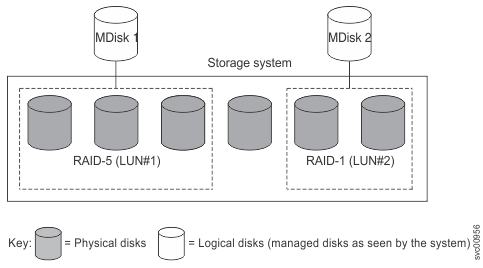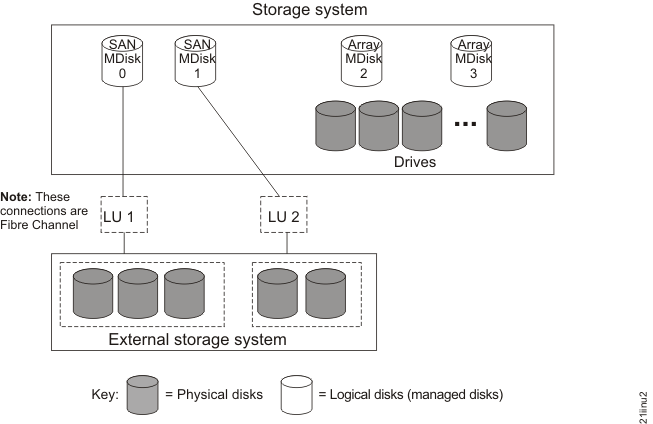MDisks
A managed disk (MDisk) is a logical unit of physical storage. MDisks are not visible to host systems. MDisks are either arrays (RAID) from internal storage or volumes from external storage system.
An MDisk might consist of multiple physical disks that are presented as a single logical disk to network. An MDisk always provides usable blocks of physical storage to the system even if it does not have a one-to-one correspondence with a physical disk.
Each MDisk is divided into a number of extents, which are numbered, from 0, sequentially from the start to the end of the MDisk. The extent size is a property of pools. When an MDisk is added to a pool, the size of the extents that the MDisk is divided into depends on the attribute of the pool to which it was added.
The access mode determines how the clustered system uses the MDisk.
includemdisk mdisk_nameAccess modes


| Status | Description |
|---|---|
| Online |
|
| Degraded paths |
|
| Offline |
|
| Status | Description |
|---|---|
| Online | The MDisk can be accessed by all online nodes. All the nodes that are
currently working members of the system can access this MDisk. The MDisk is online when the
following conditions are met: |
| Degraded paths | The MDisk is not accessible to one or more nodes in the system. Degraded path status is most likely the result of incorrect
configuration of either the storage system or the
SAN fabric. However, hardware failures in the storage system,
SAN fabric, or node might also be a contributing
factor to this state. To recover from this state,
follow these steps: |
| Degraded ports | The MDisk has one or more 1220 errors in the event log. The 1220 error indicates that the remote Fibre Channel port was excluded from the MDisk. This error might cause reduced performance on the storage system and usually indicates a hardware problem with the storage system. To fix this problem, you must resolve any hardware problems on the storage system and fix the 1220 errors in the event log. |
| Excluded | The MDisk was excluded from use by the system after repeated access errors. Run the directed maintenance procedures to determine the problem. |
| Offline | The MDisk cannot be accessed by any of the online nodes. None of the nodes that are currently working members of the system can access this MDisk. This state can be caused by a failure in the SAN, storage system, or one or more physical disks that are connected to the storage system. The MDisk is reported as offline if all paths to the disk fail. |
Extents
Each MDisk is divided into chunks of equal size called extents. Extents are a unit of mapping that provides the logical connection between MDisks and volume copies.
MDisk path
Each MDisk from external storage has an online path count, which is the number of nodes that have access to that MDisk. The path count represents a summary of the I/O path status between the system nodes and the storage device. The maximum path count is the maximum number of paths that were detected by the system at any point in the past. If the current path count is not equal to the maximum path count, the MDisk might be degraded. That is, one or more nodes might not see the MDisk on the fabric.